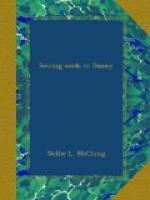One day Mr. James Ducker, lately retired farmer, sometimes insurance agent, read in the Winnipeg Telegram that his friend the Honourable Thomas Snider had chaperoned an Elk party to St. Paul. Mr. Ducker had but a hazy idea of the duties of a chaperon, but he liked the sound of it, and it set him thinking. He remembered when Tom Snider had entered politics with a decayed reputation, a large whiskey bill, and about $2.20 in cash. Now he rode in a private car, and had a suite of rooms at the Empire, and the papers often spoke of him as “mine host” Snider. Mr. Ducker turned over the paper and read that the genial Thomas had replied in a very happy manner to a toast at the Elks’ banquet. Whereupon Mr. Ducker became wrapped in deep thought, and during this passive period he distinctly heard his country’s call! The call came in these words: “If Tom Snider can do it, why not me?”
The idea took hold of him. He began to brush his hair artfully over the bald spot. He made strange faces at his mirror, wondering which side of his face would be the best to have photographed for his handbills. He saw himself like Cincinnatus of old called from the plough to the Senate, but he told himself there could not have been as good a thing in it then as there is now, or Cincinnatus would not have come back to the steers.
Mr. Ducker’s social qualities developed amazingly. He courted his neighbours assiduously, sending presents from his garden, stopping to have protracted conversations with men whom he had known but slightly before. Every man whose name was on the voters’ list began to have a new significance for him.
There was one man whom he feared—that was Evans, editor of the Conservative paper. Sometimes when his fancy painted for him a gay and alluring picture of carrying “the proud old Conservative banner that has suffered defeat, but, thank God! never disgrace in the face of the foe” (quotation from speech Mr. Ducker had prepared), sometimes he would in the midst of the most glowing and glorious passages inadvertently think of Evans, and it gave him goose-flesh. Mr. Ducker had lived in and around Millford for some time. So had Evans, and Evans had a most treacherous memory. You could not depend on him to forget anything!
When Evans was friendly with him, Mr. Ducker’s hopes ran high, but when he caught Evans looking at him with that boyish smile of his twinkling in his eyes, the vision of chaperoning an Elk party to St. Paul became very shadowy indeed.
Mr. Ducker tried diplomacy. He withdrew his insurance advertisement from McSorley’s paper, and doubled his space in Evans’s, paying in advance. He watched the trains for visitors and reported them to Evans. He wrote breezy little local briefs in his own light cow-like way for Evans’s paper.
But Mr. Ducker’s journalistic fervour received a serious set back one day. He rushed into the Mercury office just as the paper went to press with the news that old Mrs. Williamson had at last winged her somewhat delayed flight. Evans thanked him with some cordiality for letting him know in time to make a note of it, and asked him to go around to Mrs. Williamson’s home and find out a few facts for the obituary.




